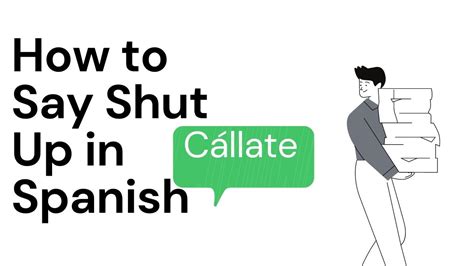How to Say "Shut Up" in Spanish: A Guide to Different Levels of Formality
Knowing how to tell someone to "shut up" in Spanish can be tricky, as the appropriate phrase depends heavily on context and your relationship with the person you're addressing. There's no single perfect translation, as the best choice will vary greatly based on your audience and the situation. This guide explores several options, ranging from polite requests to more forceful commands.
Choosing the Right Phrase: Context is Key
Before diving into specific phrases, consider these factors:
- Your relationship with the person: Are you speaking to a close friend, a family member, a stranger, or someone in a position of authority?
- The setting: Is it a casual conversation, a formal meeting, or a heated argument?
- Your intention: Do you simply want them to be quiet, or are you expressing anger or frustration?
Using the wrong phrase can lead to misunderstandings or even offense. Let's explore some options.
Polite Ways to Ask Someone to Be Quiet
These options are suitable for friends, family, or acquaintances in casual settings:
-
"Cállate," (kah-yah-tay): This is the most direct translation of "shut up," but it can be considered rude depending on the context. Use it cautiously and only with people you know well. It's generally best avoided in formal settings.
-
"Por favor, cállate" (por fah-vor, kah-yah-tay): Adding "por favor" (please) softens the command considerably, making it more polite. This is a better option than simply "cállate" in most situations.
-
"Shh": The English "Shh" works perfectly well in Spanish, too. It's a non-verbal cue that is universally understood and suitable for almost any situation where you want someone to be quiet gently.
-
"¿Puedes callarte, por favor?" (pwedes kah-yah-tay por fah-vor?): This translates to "Can you be quiet, please?" This is a very polite and indirect way to ask someone to be quiet. It's suitable for most situations.
Stronger Expressions (Use with Caution!)
These phrases are more forceful and should only be used in situations where a softer approach wouldn't be effective. Use these with extreme caution and only if absolutely necessary. They can be considered highly offensive if misused:
-
"¡Cállate la boca!" (kah-yah-tay lah bo-kah!): This literally translates to "Shut your mouth!" This is a much stronger and ruder command than "cállate." Avoid this phrase unless you're prepared for a potential negative reaction.
-
"¡Basta ya!" (bah-stah yah!): This means "Enough already!" It expresses frustration and demands that the person stop talking. While not directly translating to "shut up," it conveys a similar sentiment in a forceful way.
Beyond the Words: Nonverbal Communication
Sometimes, a simple gesture is all you need. A raised hand or a pointed finger accompanied by a stern look can effectively communicate your desire for silence, especially in noisy environments.
Conclusion: Choose Your Words Wisely
Learning how to tell someone to "shut up" in Spanish requires sensitivity to context and relationships. While direct translations exist, it's often better to opt for more polite requests, especially in unfamiliar social situations. Consider your audience and choose your words carefully to avoid unintended offense. Remember, nonverbal cues can also be powerful tools in managing noise and unwanted conversation.
